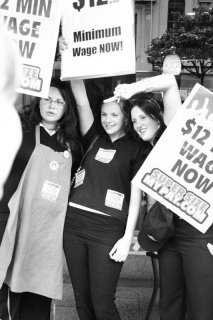The Abortion Supervisory Committee released its report last week. I was going to comment on it after usual round of press releases condemning women who aren't sufficiently committed to their wombs, but they didn't come.
The abortion rate went down, and I'm always very wary of celebrating that fact. At one of the meet the candidates meeting Sue Kedgley said that she believed that every abortion was a tragedy. I refuse to frame abortion as a necessary evil.
Women do feel a wide variety of different things about their individual abortions and of course whatever an individual woman fees feel is the reality for that abortion. If a woman feels relieved, then that abortion is a relief, if a woman feels distraught, then that abortion is distressing.
But in a wider context I don't care what the abortion rate is, I don't care if it's high or low. While I believe in some policies that are shown to reduce the abortion rate (eliminating poverty, education about contraceptives, and the development of better contraceptives, for example), I believe in them for their own sakes, and I'd keep on believing in them if they were shown to increase the abortion rate. To me the fact that the abortion rate went down is just that, a fact.
This is an interesting article about the way abortion is shown on American network telvision (via Feministe), or rather the fact that it's not shown:
Real women have had decades of hard-won reproductive freedom in this country, but their televised doppelg do not have the same options. Why aren't our real-world choices reflected in our pop culture landscape? If the networks can show violence against women and teen sex and rape (shows like Law and Order: SVU are propagated entirely on those topics), why can't we see the outcomes of those actions? Abortion is not a dirty word, nor is it simply a political topic. It deserves a place on TV, and not just on C-SPAN.
Now my not-so-secret-TV-boyfriend Joss Whedon has talked about trying to write a script on Roseanne where Jackie got pregnant and had an abortion, and once it got mangled through the various notes she wasn't even allowed to get pregnant. I wonder if Firefly hadn't been cancelled if he'd have gone back there - I would have loved it if he'd portrayed it in a truly matter of fact kind of a way. Although if that happened I'd probably spend even more money on stuff he's created than I already do, so maybe it's all for the best.
What I was curious about is whether it was any different in New Zealand. In particular the portrayal of abortion on Shortland St. Have their been any abortions on Shortland St, how were they portrayed? How about unplanned pregnancies. I wouldn't be surprised if things were no better here than they were in America, but don't watch enough local TV to know for sure.
Finally if you're interested in abortion I recommend reading
Abortion Clinic Days, by two women who work in an abortion clinic. What I find so frustrating about the abortion debate is that abortion is part of women's experience, whatever the legal status is, and whatever moral frameworks anyone wants to throw at it. This blog shows that reality is far more important than all the philosophy class pontificating, or church moralising, you've got.












